SSC CGL - Detailed Guide 2025
Self-Paced Course

Local Self Government
Reference: Lucent GK, NCERT Class 6–12
1. Panchayati Raj System – 73rd Constitutional Amendment Act, 1992
| Feature | Description |
|---|---|
| Constitutional Status | Added Part IX (Art. 243 to 243-O) & Eleventh Schedule |
| Enforced on | 24 April 1993 |
| Objective | Democratic decentralization and local self-governance in rural areas |
Structure of Panchayati Raj (Three-Tier System):
- Gram Panchayat – Village level
- Panchayat Samiti – Block level (Intermediate)
- Zila Parishad – District level
Note: States with <20 lakh population may not establish intermediate tier.
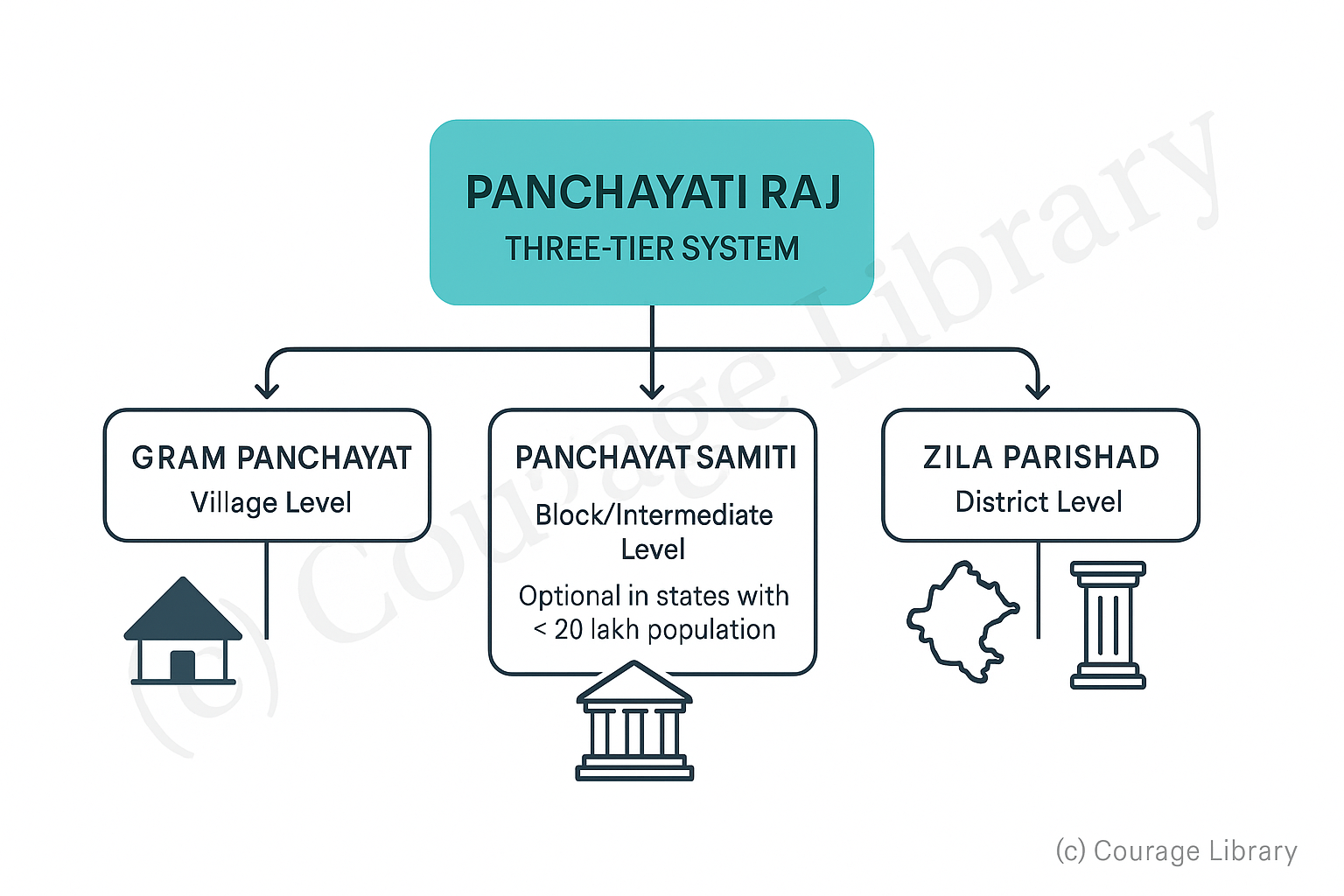
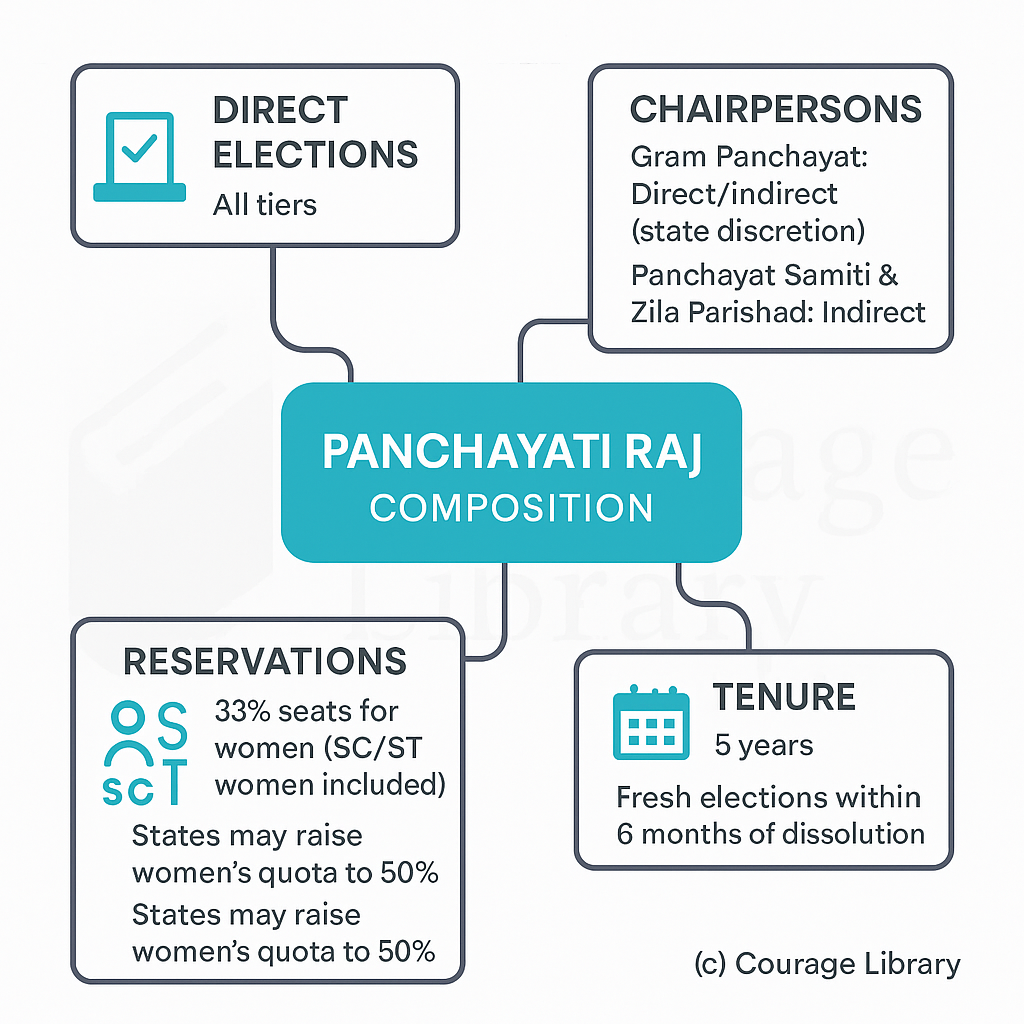
Composition:
- Direct election to all seats in all tiers
- Chairpersons:
- Gram Panchayat – elected directly/indirectly as per state
- Panchayat Samiti & Zila Parishad – elected indirectly
Reservations:
- 33% seats reserved for women (including SC/ST women)
- SCs and STs – in proportion to their population
- State can increase women's quota to 50%
Tenure:
- 5 years
- Fresh elections within 6 months of dissolution
State Election Commission (Art. 243K):
- Conducts elections to Panchayats
- Appointed by Governor
State Finance Commission (Art. 243I):
- Constituted every 5 years to recommend financial distribution
Eleventh Schedule – (29 Subjects):
Includes agriculture, rural development, roads, health, primary education, etc.
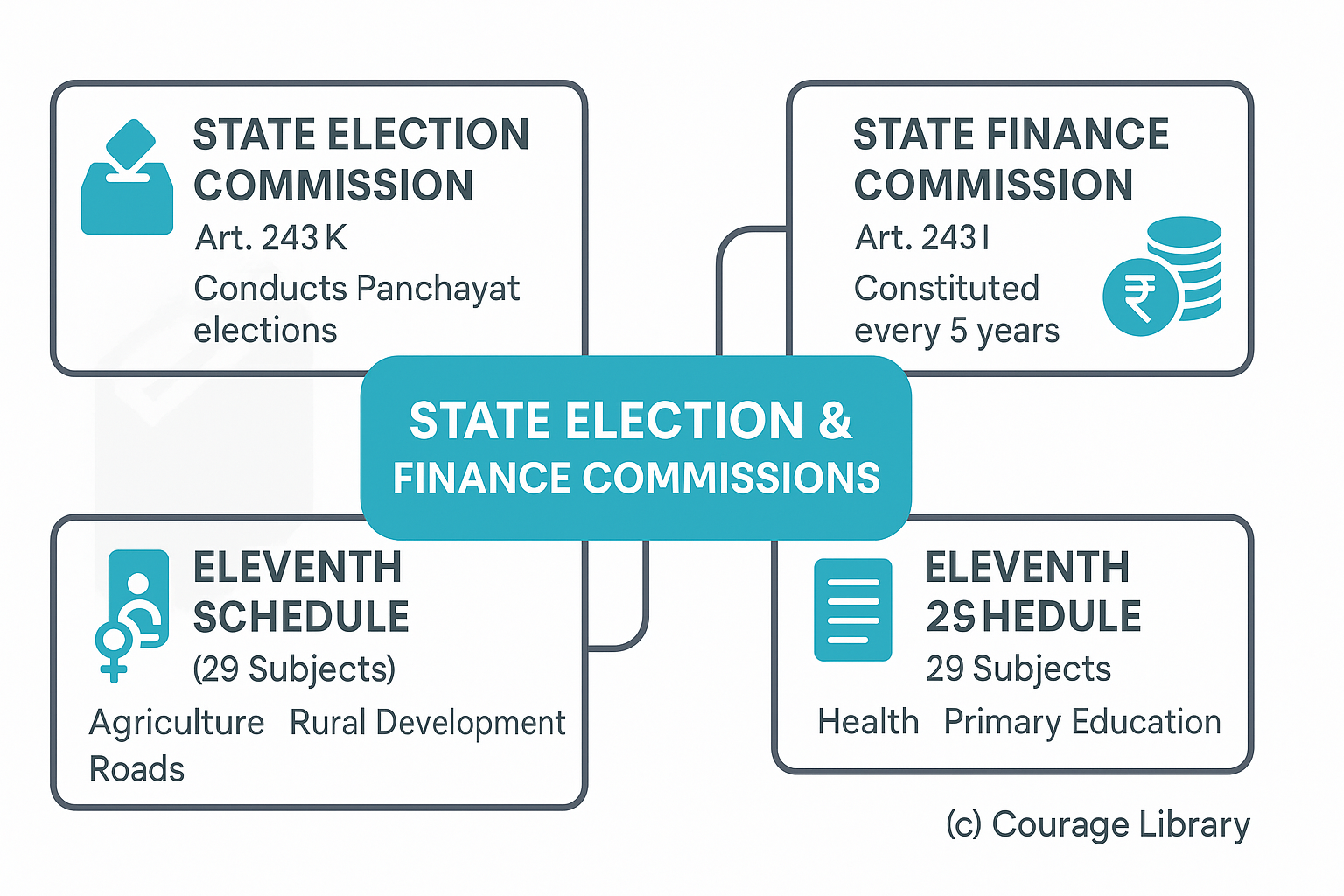
2. Municipalities – 74th Constitutional Amendment Act, 1992
| Feature | Description |
|---|---|
| Constitutional Status | Added Part IX-A (Art. 243P to 243ZG) & Twelfth Schedule |
| Enforced on | 1 June 1993 |
| Objective | Provide urban governance and planning |
Types of Urban Local Bodies:
| Type | Criteria & Function |
|---|---|
| Nagar Panchayat | Transitional areas (rural → urban) |
| Municipal Council (Municipality) | For smaller urban areas |
| Municipal Corporation | For large urban areas (e.g., metro cities) |
Composition:
- Directly elected representatives
- Chairperson:
- Direct/indirect election as per state laws
- Wards Committees – mandatory in Municipal Corporations with population >3 lakh
Reservation:
- Same as Panchayats – SC, ST, and women (min 33%)
Tenure:
- 5 years
- Re-election within 6 months on dissolution
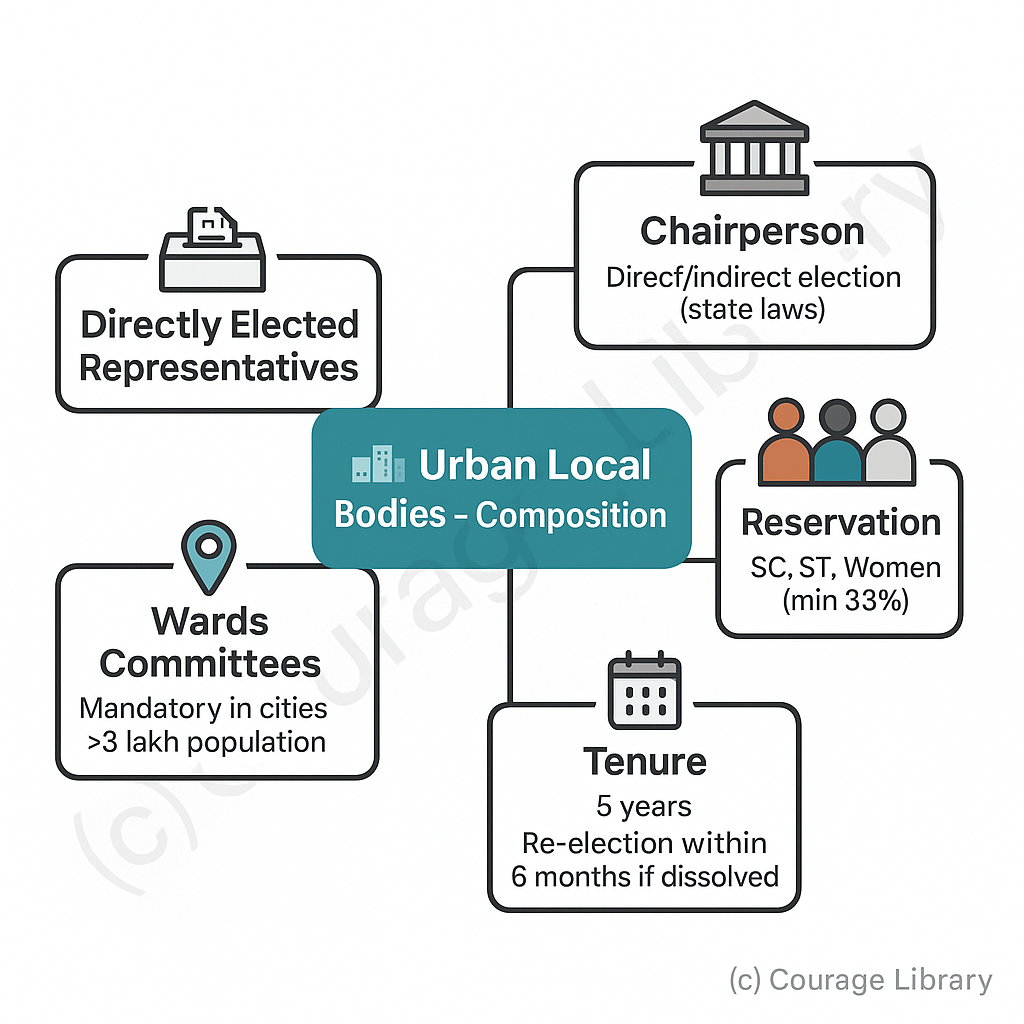
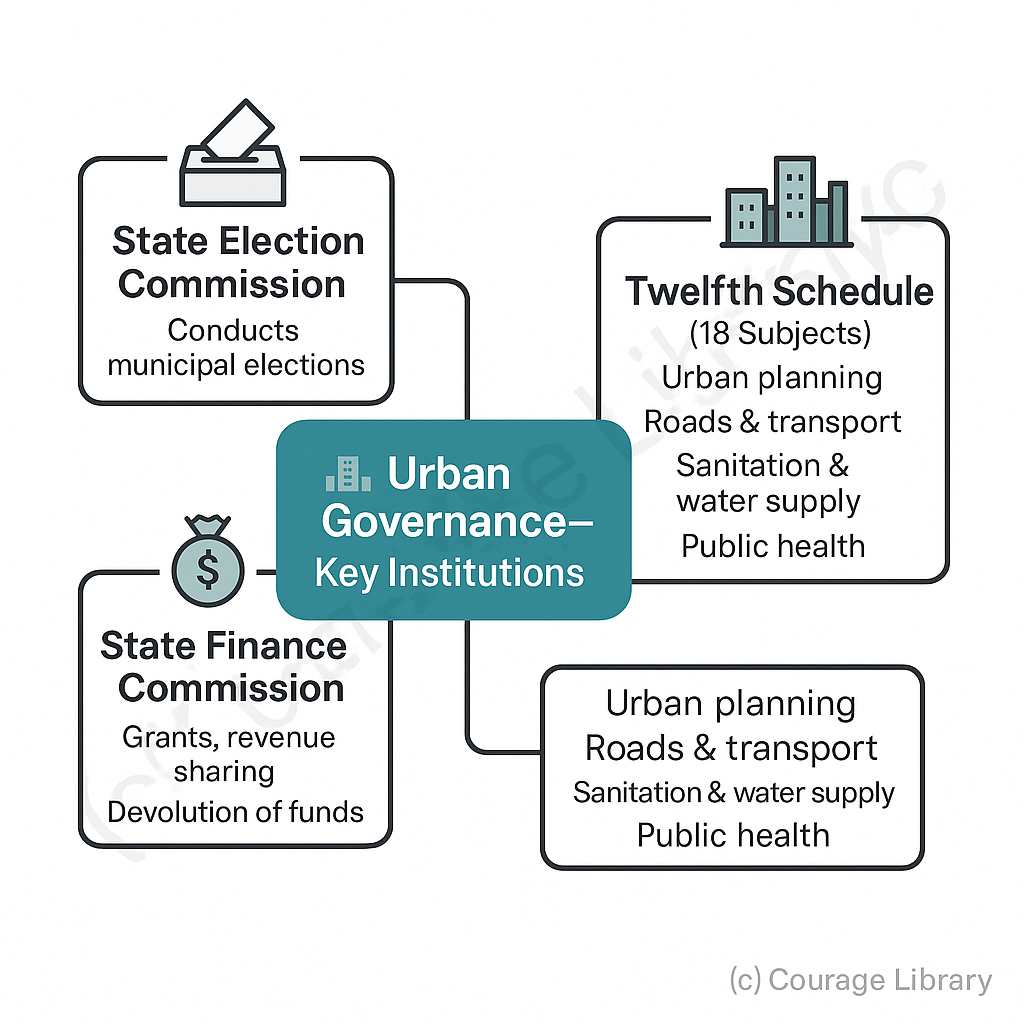
State Election Commission:
- Conducts elections to Municipal bodies
- Independent authority
State Finance Commission:
- Recommends grants, revenue sharing, and devolution of funds
Twelfth Schedule – (18 Subjects):
Includes urban planning, roads, sanitation, water supply, public health, slum improvement, etc.
3. Structure, Functions & Finance of Local Bodies
Structure:
| Tier | Rural (Panchayati Raj) | Urban (Municipalities) |
|---|---|---|
| 1st Tier | Gram Panchayat | Nagar Panchayat |
| 2nd Tier | Panchayat Samiti (Block) | Municipal Council |
| 3rd Tier | Zila Parishad (District) | Municipal Corporation |
Functions:
- Rural: Water supply, sanitation, roads, poverty alleviation, education
- Urban: Town planning, health, housing, solid waste management, transport
Finance:
- Taxes assigned by state (house tax, profession tax, etc.)
- Grants-in-aid from Union and State Governments
- Funds recommended by Finance Commissions
- Local body loans & revenue from services (fees, tolls, rent)
Summary:
| Feature | Panchayati Raj (73rd) | Municipalities (74th) |
|---|---|---|
| Year Enacted | 1993 | 1993 |
| Part of Constitution | Part IX | Part IX-A |
| Schedule Added | Eleventh Schedule (29 subjects) | Twelfth Schedule (18 subjects) |
| Applicable Area | Rural | Urban |
| Conduct of Elections | State Election Commission | State Election Commission |
| Tenure | 5 Years | 5 Years |
Developed By Jan Mohammad
Next
Start Your SSC CGL Journey Now!
Join Courage Library to experience disciplined study and expert support.
Be a Couragian!